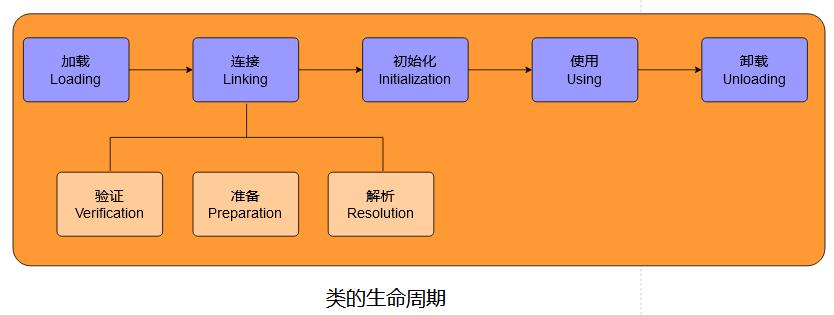深入理解Java虚拟机——类加载的时机
Posted 小志的博客
tags:
篇首语:本文由小常识网(cha138.com)小编为大家整理,主要介绍了深入理解Java虚拟机——类加载的时机相关的知识,希望对你有一定的参考价值。
目录
一、类加载的时机概述
- 类从被加载到虚拟机内存中开始,到卸载出内存为止,它的整个生命周期包括:加载(Loading)、验证(Verification)、准备(Preparation)、解析(Resolution)、初始化(Initialization)、使用(Using)、和卸载(Unloading)7个阶段,其中验证(Verification)、准备(Preparation)、解析(Resolution)3个部分称为连接(Linking)。
- 7个阶段的发生顺序如下图:

二、加载阶段
- Java虚拟机规范中并没有进行强制约束,这点可以交给虚拟机的具体实现来自由把握。
三、初始化阶段
3.1、初始化阶段的概述
- 对于初始化阶段,虚拟机规范则是严格规定了有且只有5种情况必须立即对类进行“初始化”(而加载、验证、准备自然需要在此之前开始)。
3.2、以下5种情况必须立即对类进行“初始化”
-
遇到new、getstatic、putstatic或invokestatic这4条字节码指令时,如果类没有进行过初始化,则需要先触发其初始化。
生成以上这4条指令的最常见的Java代码场景如下:
(1)、使用new关键字实例化对象的时候。
(2)、读取或设置一个类的静态字段(被final修饰、已在编译期把结果放入常量池的静态字段除外)的时候。
(3)、调用一个类的静态方法的时候。 -
使用java.lang.reflect包的方法对类进行反射调用的时候,如果类没有进行过初始化,则需要先触发其初始化。
-
当初始化一个类的时候,如果发现其父类还没有进行过初始化,则需要先触发其父类的初始化。
-
当虚拟机启动时,用户需要指定一个要执行的主类(包含main()方法的那个类),虚拟机会先初始化这个类。
-
当使用JDK1.7的动态语言支持时,如果一个java.lang.invoke.MethodHandle实例最后的解析结果REF_getStatic、REF_putStatic、REF_invokeStatic的方法句柄,并且这个方法句柄所对应的类没有进行过初始化,则需要先触发其初始化。
3.3、以下3种情况不被“初始化”
- 通过子类引用父类的静态字段。
- 通过数组定义来引用类。
- 调用类的常量。
四、主动引用和被动引用
- 以上5种场景中的行为称为对一个类进行主动引用。
- 除此之外,所有引用类的方法都不会触发初始化,称为被动引用。
五、主动引用的示例
5.1、父类还没有进行过初始化,则需要先触发其父类的初始化。
对类进行“初始化”中第3.2章节中第3点和第4点的代码示例
-
代码
package com.xz.springboottest.day11; /** * @description: * @author: xz */ public class Parent static System.out.println("【父类】已经初始化了");package com.xz.springboottest.day11; /** * @description: * @author: xz */ public class Child extends Parent static System.out.println("【子类】已经初始化了"); public static void main(String[] args) -
运行结果如下:

六、被动引用的示例
6.1、通过子类引用父类的静态字段而不被“初始化”
对类不进行“初始化”中第3.3章节中第1点的代码示例
-
代码
package com.xz.springboottest.day11; /** * @description: * @author: xz */ public class Parent static System.out.println("【父类】已经初始化了"); public static int value =10;package com.xz.springboottest.day11; /** * @description: * @author: xz */ public class Child extends Parent static System.out.println("【子类】已经初始化了");package com.xz.springboottest.day11; /** * @description: * @author: xz */ public class Test public static void main(String[] args) System.out.println(Child.value); -
运行结果如下:

-
总结
对于静态字段,只有直接定义这个字段的类才会被初始化,因此通过其子类来引用父类中定义的静态字段,只会触发父类的初始化而不会触发子类的初始化。
6.2、通过数组定义来引用类而不被“初始化”
对类不进行“初始化”中第3.3章节中第2点的代码示例
-
代码
package com.xz.springboottest.day11; /** * @description: * @author: xz */ public class Parent static System.out.println("【父类】已经初始化了"); public static int value =10;package com.xz.springboottest.day11; /** * @description: * @author: xz */ public class Child extends Parent static System.out.println("【子类】已经初始化了");package com.xz.springboottest.day11; /** * @description: * @author: xz */ public class Test public static void main(String[] args) Child[] children=new Child[10]; -
运行结果如下:

-
总结
通过数组定义来引用类,不会触发此类的初始化。
6.3、调用类的常量而不被“初始化”
对类不进行“初始化”中第3.3章节中第3点的代码示例
-
代码
package com.xz.springboottest.day11; /** * @description: * @author: xz */ public class ConstClass static System.out.println("常量类已经初始化了"); public static final String HELLO="hello";package com.xz.springboottest.day11; /** * @description: * @author: xz */ public class Test public static void main(String[] args) System.out.println(ConstClass.HELLO); -
运行结果如下:

-
总结
调用类的常量,不会触发此类的初始化。
以上是关于深入理解Java虚拟机——类加载的时机的主要内容,如果未能解决你的问题,请参考以下文章